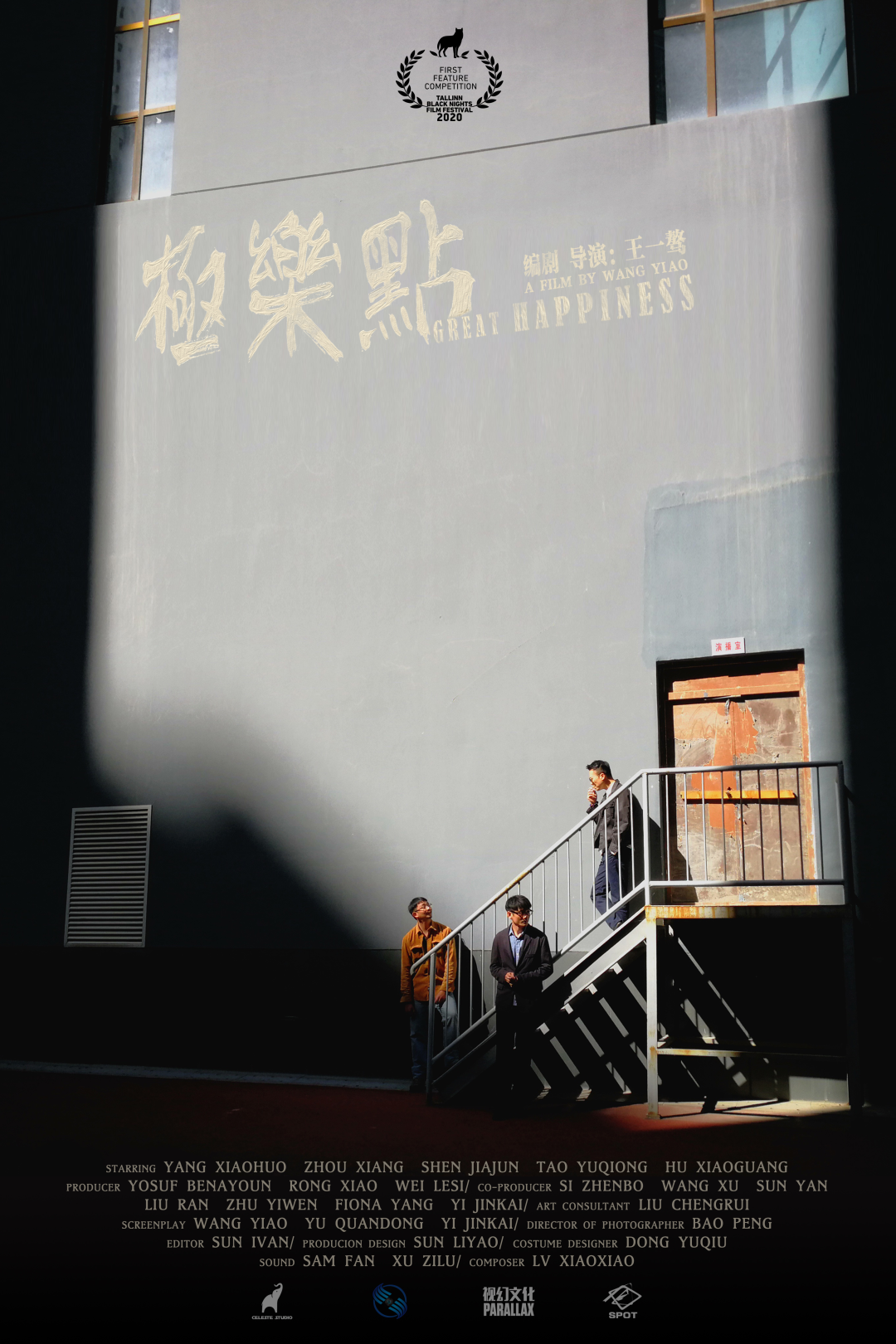
Three young men find their paths to prosperity in the modern China abruptly severed in Wang Yiao’s ironically titled Great Happiness (极乐点, jílè diǎn). Great happiness is to them an ever elusive concept overburdened as they are as children of the One Child Policy caught in the midst of the rapid changes which transformed the nation into the capitalist powerhouse it is today. Each of them is in one way or another failed by that transformation, denied the sense of possibility they are continually promised while repeatedly exploited by a society in which everything really is about money.
Childhood friends Wang, Sui, and Li are each trying to achieve independent success as “entrepreneurs” in the new society, but are also divided by their contradictory goals. For Li, a spoilt rich kid and ambitious fantasist, it’s not so much money that matters as the appearance of it. He buys BMWs on a whim, but has to run across town to ask his mother for money to invest in his “businesses” while it later transpires that his fiancée Xin with whose family he is in dispute over the financial arrangements of the marriage is actually paying their household bills. Unbeknownst to him his mother’s business is struggling, they’ve already sold the assets he was counting on to fund further business ventures, and while they’ll always support him his parents do not have the capability to bankroll his frequent failures. Needing everyone to see him as a big shot, he books a fancy hotel for the wedding despite Xin’s concerns, slapping down his credit card for the 50% deposit only to have it later declined when trying to pay for the ring. Hooked on another sure thing by dodgy friend Ma, he gets himself in trouble by making an unwise arrangement with a loanshark mortgaging something which might not strictly speaking be his.
Architect Sui’s fiancée Lisa is wary of Li fearing he’s a bad influence and while she might be right Sui makes a few bad decisions of his own including taking a mistress when she travels to the UK to study abroad. Li is investing in his business which given the construction boom in the modern society ought to be a sure thing though Sui also has an artistic temperament and objects to the essential uniformity of the modern Chinese city. Li doesn’t get why he can’t just pull generic designs off the internet rather than coming up with his own while Sui isn’t convinced by his desire to invest in Wang’s burgeoning media business fearful that it will be just another boom and bust industry soon to be oversaturated by the similarly ambitious.
Wang has been married four years but is yet to conceive a child much to his parents’ consternation. His burden is all the greater as a son of the One Child Policy meaning the responsibility for continuing the family name lies only with him as his grandfather continually points out. His parents who were once wealthy but lost everything in the late ‘90s industrial reforms are so concerned that they pledge all their savings to an IVF programme while granddad objects convinced that paternity cannot be guaranteed and like the factory boss Wang lies to in order curry favour believes they’d be better off with a shaman. Even in the modern society in which “superstition” is frowned upon such beliefs remain common, the factory boss obsessed with “wealth gods” and seeking to surround himself with men who have recently fathered children in order to increase his luck.
As might be expected, the IVF programme is not entirely on the level, explaining to the family that they need to sign a confidentiality agreement because the treatment they offer is technically unlicensed. They don’t like to describe it as “illegal” because it’s more like the law just hasn’t been updated yet. Sui encounters something similar when his mother comes down with a mysterious illness that seems to be some kind of rare cancer potentially caused by the pesticides used to grow the apples which she had been fond of eating for the benefit of her health, poisoned by the modern industrial machine just like the polluted fish stocks Wang’s mother had been forcing her daughter-in-law to eat believing they’d help her conceive but may actually have been causing her infertility. The medicine Mrs Sui needs exists, but it’s prohibitively expensive and not covered by insurance leaving the family with little choice than to consider selling everything they own including the apartment purchased for Sui’s upcoming marriage.
In the contemporary society a man’s worth is measured in square meters according to a jaded youngster but there is something of an economic hubris in the visions of these myriad, identical apartment blocks that no one can really afford to buy. While Li, the naive capitalist, and Sui the flawed intellectual whose disappointed father runs a moribund ping pong school in an old temple almost an embodiment of the ghosts of China’s past, Wang (who shares his first name with the city in which he lives) may actually come out on top flashing his hidden capitalistic fangs in his unexpected ruthlessness while simultaneously under increasing family pressure to have a second child now that the One Child Policy has become a Two Child Policy. “Everything he had was borrowed” the friends lament of Li having learned something of the truth he tried so hard to hide. “Who was he trying to impress?” perhaps missing the point in this ordinary tragedy of the modern China.
Great Happiness streamed as part of Odyssey: a Chinese Cinema Season.
Original trailer (Simplified Chinese / English subtitles)
